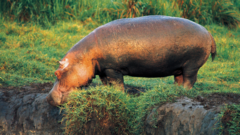At least 50 hippos and other large animals have fallen victim to an anthrax outbreak in the Virunga National Park, a UNESCO World Heritage Site in the Democratic Republic of Congo (DRC). Park officials reported the grim discovery of the deceased animals floating in the Ishasha River, with symptoms first noted last week. Confirmative tests have identified the pathogen responsible for the fatalities, raising alarms about the potential spread of the disease.
Emmanuel De Merode, the park director, indicated that recovery and burial efforts are ongoing to curb further contamination. However, he highlighted logistical challenges in carrying out these tasks due to difficult access and an absence of excavators. "We have the means to limit the spread by... burying them with caustic soda," De Merode explained, stressing the critical nature of these precautions.
The Ishasha River flows northward into Lake Edward, prompting concerns as reports of additional dead animals emerge from local communities. Anthrax, caused by the Bacillus anthracis bacterium, poses serious health risks yet is not easily transmissible among species. The spores can reside in soil for years before entering an animal's system through inhalation or injury.
In light of the outbreak, the Congolese Institute for the Conservation of Nature has issued warnings to local populations to steer clear of wildlife habitats and ensure that water from natural sources is boiled before consumption. Spanning 7,800 square kilometers, Virunga is renowned for its biodiversity yet remains a hotbed for conflict among various armed militia groups vying for control over the region's wealth of resources.
This tumultuous environment complicates conservation efforts as many rangers dedicated to protecting wildlife have lost their lives in this melee. The hippo population, which drastically plummeted from over 20,000 to just a few hundred over the decades due to poaching and warfare, has been under serious protection initiatives in recent years.
The urgency of this situation in Virunga National Park serves as a critical reminder of the intersection between wildlife health, human safety, and the overarching need for enhanced conservation strategies amid ongoing unrest in the region.



















